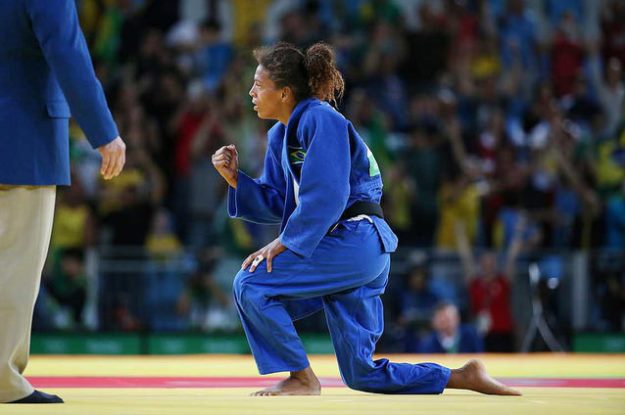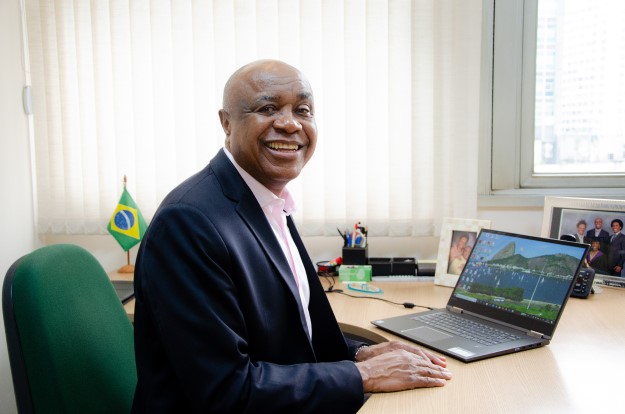If you’re looking for signs that LGBT inclusion in the sports world is on the rise, the Rio 2016 Olympics are a good place to start.
Despite concerns surrounding the host city, the competition itself has gone off (mostly) without a hitch; for LGBT people in Brazil and around the world, it’s been downright monumental. Here’s why:
First, there’s the athletes themselves. This year’s games have included more openly LGBT athletes than ever before, including several from Brazil. This includes beach volleyball player Larissa França, who is looking to best her 2012 bronze-medal performance, and top Brazilian diver Ian Matos. The degree to which athletes have felt free to openly discuss their sexual orientation is certainly a sign of more relaxed attitudes and wider acceptance of LGBT people in sports. While only 11 gay male Olympians at the Rio Games are publicly out, that number is a record high, up from just one openly gay male athlete at the 2008 Beijing Games.
Wade Davis, executive director of the You Can Play Project, an advocacy group that facilitates the coming out process for athletes and works with organizations like the International Olympic Committee to be more inclusive, told AQ that this year’s games represent a “global change” for LGBT people that is both a result of countries passing LGBT-affirming policies and a factor in more countries following suit.
“When you see openly gay athletes in a space like the Olympics, it reminds people that there is a broad spectrum of what it means to be LGBT,” Davis told AQ. “It also helps debunk a lot of myths about what it means to be an LGBT athlete, and this outcome will have an impact on different types of policies being passed.”
While there are no out transgender athletes in this year’s games, a transgender runner for the men’s U.S. national team, Chris Mosier, was the subject of a Nike ad aired during the games. Davis called the ad “revolutionary.”
“That impact is going to reverberate nationally, internationally, everywhere,” he said.
That ad speaks to the uniquely inclusive environment surrounding the Rio Games. A far cry from the Winter Games in Sochi two years ago, which were played under the specter of the Russian government’s anti-gay politics, these Olympics have provided an important platform for the visibility of LGBT people. The way that gay athletes have been received speaks to a positive change in global perceptions of the LGBT community. One example early in the competition is when the Olympics saw its first same-sex marriage proposal as Brazilian rugby player Isadora Cerullo said “yes” to her girlfriend on the field after a game; photos of the proposal spread quickly on social media and news outlets worldwide.
Even before the games began, a kiss between a gay couple passing the Olympic torch made the rounds online, while at least three transgender women proudly participated in the Olympic torch relay at different points. During the opening ceremony, transgender model Lea T led Brazil’s team of athletes into the stadium – a symbolic moment in a country that ranks first in reported murders of transgender people.
Finally, out athletes – including some from Latin America – have not only competed in the games, but have excelled, challenging homophobic stereotypes and becoming role models for LGBT youth. Rafaela Silva, a judo star who became a national hero after winning Brazil’s first gold medal of the games, is one of those athletes. A black woman from Rio’s Cidade de Deus (City of God) favela, Silva’s seemingly unlikely ascent to Olympic glory inspired many. In the days after her victory, her story took on new meaning when she confirmed to Globo Sports that she is in a relationship with a woman, proudly attributing much of her success to her girlfriend of three years.
Openly gay male athletes have excelled, too, though not to the degree of their female counterparts. Tom Daley, a diver from the U.K., took home a bronze medal on the third day of the competition. Though NBC Sports ignored his cheering fiancé in the crowd, Daley’s openness with his sexuality has encouraged other athletes to come out.
To be sure, Rio has also exposed lingering homophobia in ugly ways: Brazilian spectators reportedly chanted a homophobic slur at the U.S. women’s soccer team, which includes at least one lesbian player and a lesbian coach. That openly gay female athletes far outnumber openly gay male ones is a sign that expectations of masculinity still make being out in sports an elusive reality for many athletes.
Still, the level of visibility and inclusivity seen in Rio so far is significant. For millions of LGBT people around the world, seeing openly gay people compete in the Olympics is the first opportunity to see gay people living their lives outside of the lens of scripted media portrayals. Seeing LGBT athletes will inevitably encourage others to come out as well.
That this shift in athletic culture would occur in Latin America may be striking, given high levels of homophobia and anti-LGBT violence in countries like Brazil, where a gay or transgender person is reportedly killed every day. But the progress on display in Rio shouldn’t be surprising. Latin America has emerged in recent years as a global leader in the cause of LGBT rights, promoting inclusivity in Congress, the judiciary, and even the United Nations.
Now, it looks like it could be adding the sports world to that list.
—
O’Boyle is an editor for Americas Quarterly.









